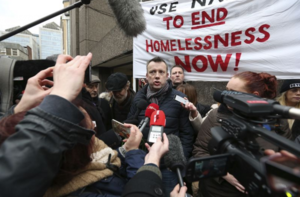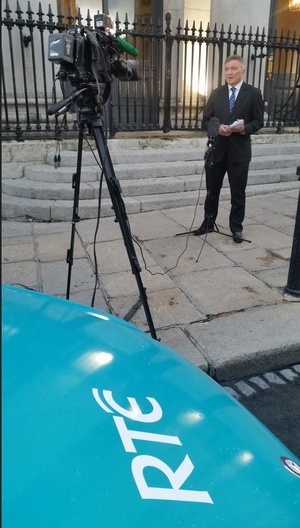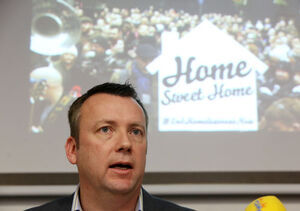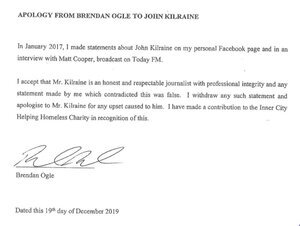
Brendan Ogle outside Apollo House on January 12
You may recall RTÉ One’s report from Monday, by John Kilraine – about the former headquarters of the Unite trade union, on Merrion Square in Dublin, which has been vacant for three years.
It was reported:
“…a trust connected to the trade union Unite applied to be exempted from social housing for a development at its former headquarters…while one of its top officials was planning the occupation of Apollo House…”.
The report went on to say Brendan Ogle, of Unite and the Home Sweet Home movement, gained access to Apollo House a day after Unite’s application for a Social Housing Exemption Cert was granted by Dublin City Council.
Mr Ogle subsequently wrote a lengthy post on Facebook concerning the RTÉ report.
Further to this…
Yesterday evening, Mr Ogle spoke to Matt Cooper on Today FM about the matter, during which a statement from RTE was read out.
A transcript of the interview:
Matt Cooper: “Brendan Ogle, Home Sweet Home organiser, also the Unite trade union’s education and policy officer has joined us in studio today. Jimmy Kelly, the regional organiser, of course, was with us on yesterday’s programme to respond to the story which RTE broke yesterday about the former Unite headquarters in Merrion Square being vacant for the last three years. Leading to questions as to why it could not have been used as a venue to look after the homeless people rather than occupying Apollo House in Dublin city centre. Brendan Ogle, can you understand why people would ask that, and regard it as a legitimate question?”
Brendan Ogle: “No.”
Cooper: “Why not?”
Ogle: “I can’t understand why a workers’ organisation and volunteers and members of it, which is an non-profit organisation, a friendly society organisation, comes under attack for helping homeless people. I can’t understand it.”
Cooper: “Attack. Why do you say attack?”
Ogle: “Well, because, this is not journalism. We were approached by RTE at lunchtime, Saturday afternoon. I was approached, notwithstanding the fact I had nothing to do with property. I don’t even own one, nevermind having anything to do with it. And it was a very complex question. And Jimmy Kelly, who you’ve just mentioned – the leader of Unite in Ireland – sought, until today, until Tuesday, to provide RTE will full facts. Bearing in mind, Matt, that it was Saturday afternoon, if we’d got contacted on Monday, or even on Friday, we might have been able to do something.”
Cooper: “Sorry, had you not anticipated at any stage, over the last month or so, that somebody might come along and say to you, ‘hang on a second, you’re very involved in this campaign, you’re leading it down in Apollo House and, as it happens, you have a large building in Merrion Square which has been vacant for three years. If you’re concerned about the homeless, why didn’t you actually use that as a venue to house people?”
Ogle: “No, I didn’t anticipate it. I anticipated that elements of the media were up to no good when they were standing outside the gates of Apollo House, offering homeless people, going in and out, money to tell stories about what was going on in there. That was going on the whole time. So I appreciate…”
Cooper: “I have to say, I know nothing about that…I don’t know which organisations may have done that.”
Ogle: “Absolutely, and actually it wasn’t RTE either, it was print outlets. But I watched it, and I watched it on several occasions. So I anticipated a dirty tricks campaign because any time anybody stands up and puts there head above the parapet, be it the union or be it me or be it a long list of other people in this country – and stands up for people who need help – then agendas quickly set in…”
Cooper: “Hang on, why is it, no, no, no, hold on a second, why is it a dirty trick to ask what many people regard as a legitimate question as to why you did not use the property in Merrion Square?”
Ogle: “Well, first of all, it’s not a legitimate question because we went into Apollo House, very clearly stating – first of all, we were asked could we get into Apollo House by the artists. We’ve stated that, on the record, a number of times. So that loop was left out of the questions. Second of all, we went into Apollo House because it was a Nama property. We already own, and I’m not going to discuss it again – I will if you want, if you’ve the time – but the point about it is: it was a Nama property. As it turns out we were quite entitled to look for time to look into this. When we looked for time to look into it, we discovered that the so-called obligations do not apply at all because there’s only four units planned in Merrion Square. And [former environment minister] Alan Kelly changed the requirements to nine. So we can’t give someone .04 of a unit. And then we discovered today – and John Kilraine could have been told this, if he’d waited till… well I could have said I don’t know why the story was broken yesterday. I know exactly why the story was broken yesterday…”
Cooper: “Well, you assume you know why, you don’t actually know directly. Let’s be fair now…”
Ogle: “I’m suggesting, okay, I’m suggesting and I fully, genuinely and sincerely believe – the story was broke yesterday to damage me, to damage Unite trade union, so the facts that we discovered today would come out after the damage was done. I’m suggesting that, I sincerely, honestly and earnestly believe that to be the case. And what we have discovered is that, three years ago, Unite trade union spoke to a number of groups working with homelessness – which wasn’t as bad then as it is now, but was on the way – and invited them to look at Merrion Square and see was it appropriate for housing emergency accommodation. And one of the groups, the others can identify themselves, but one of the groups that will be happy to identify themselves was Focus Ireland, who came into Merrion Square three years ago, looked at it, looked at the state of the building and decided that, for emergency accommodation for the services they provide homeless people that that was not a suitable location – notwithstanding any planning problems. And we have worked very, very well in Home Sweet Home, we have…”
Cooper: “Hang on, why didn’t you know that or Jimmy Kelly knew that? Who, in Unite, actually spoke with Focus Ireland and why did they not tell you that?”
Ogle: “Well, first of all, Matt. Staff, as you know here, come and go and move through situations and we looked for time of RTE to give a full, detailed response to those questions. If the question had come on a working day, we could have done it quicker. It came on a Saturday afternoon, very bizarre altogether. Saturday afternoon? We looked for Tuesday, I don’t think it was unreasonable, there’s no reason why RTE couldn’t have waited until Tuesday and it took us time to do a search of our records, of our archives, or our emails, and of our systems. We’re not in that building anymore, Matt. We’ve got rid of that building. Our headquarters by the way…”
Cooper: “Have you got rid of it? You still own it, don’t you?”
Ogle: “It’s held by a trust and I think it’s on the market. My headquarters, Matt, and all the years I’ve sat with you in this building and in your previous building, in Abbey Street, you were over there once too, my headquarters is in Abbey Street..”
Cooper: “Yes.”
Ogle: “It’s always been in Abbey Street and what we are saying, putting on the record today, we’ve issued a statement at 5pm is that Unite trade union did that with charities working in the NGO sector. Focus Ireland, I believe, will confirm that – that could have been confirmed, had RTE simply waited until today. But there was a rush to judgment. There was an agenda set, in my honestly and earnestly held opinion and it’s unbecoming journalism and it’s unbecoming of the national broadcaster.”
Cooper: “Ok, but even if Focus Ireland didn’t want to use it, and I’ll come back and I’m going to ask the question: a lot of people would have said, if Focus Ireland had gone into Apollo House, they would have said that wasn’t suitable either. Now, you decided to takeover Apollo House, make it suitable, and the question is, if your issue was looking after homeless people, instead of occupying a building belonging to somebody else, why did you not use a building to which you had access?”
Ogle: “Our issue wasn’t looking after homeless people. Our issue was forcing the Government to fulfil its obligation to look after homeless people. The role, the job of looking after homeless people does not fall on Brendan Ogle’s office, on Jimmy Kelly’s office and Jim Sheridan’s house and Glen Hansard’s wardrobe – it falls on the Government. And the Government have a land bank called Nama and Apollo House was full of Nama. By the way, Apollo House, Matt, would accommodate ten times’ the number of homeless people and an awful lot quicker. We were able to kit it out in a day and a half. That could never have been done in any other building of a similar size and no other building of a similar size was available anyway.”
Cooper: “Nama, though, has offered many properties to various local councils around the country, including Dublin City Council and the various councils have rejected many of those particular properties. So, Nama has actually tried to give properties – is that not an issue? So, why takeover a Nama commercial building for this particular purpose?”
Ogle: “Well, Nama has offered buildings that local authorities have thought to be unsuitable and Nama has refused to offer other buildings that local authorities have sought – these are two arms of the State. Hold on, Matt, now. These are two arms of the State who are talking to each other against a background of at least 7,000 officially homeless people. Now, can I just make this point, Matt, because I don’t know how long we’ve got. I’m happy to stay here all night. But can I make this point: what is so wrong about people giving up their Christmas, using their energy, their activism and their resources – there was no homeless person who died on the streets of Dublin this Christmas, none. There was a fantastic atmosphere in Apollo House, it has put an historic spotlight on this emergency…”
Cooper: “But hold on a second, Brendan, that wasn’t all down to you…in fairness…”
Ogle: “No, no…”
Cooper: “I’m not criticising your bona fides in relation to this, right. But there’s the work of the likes of the Simon Community, the Peter McVerry Trust, Focus Ireland, the work by Dublin City Council as well – in putting new facilities in place. There are an awful lot of people, even before you came along…”
Ogle: “Absolutely…”
Cooper: “With the Home Sweet Home campaign who have been trying their damnedest…”
Ogle: “Absolutely, and Matt, you’ve never heard me and nobody has ever heard me saying a bad word against any of those people. And despite their best efforts, despite their very best efforts, homelessness continues to skyrocket, we’ve got over 7,000 people, we’ve got Santa Claus coming to hotels and a lot of those people have discussed it with Home Sweet Home and discussed it with me, and discussed it with other people over the last few weeks. This has helped those people and those agencies make the case: what is so objectionable about that?”
Cooper: “Ok, but isn’t Nama’s remit, as set down by legislation, to get as much money back as possible for the State?”
Ogle: “No, it’s not. Section 14 of the Nama Act 2009 provides a remit for Nama to be aware of their social responsibilities. Home Sweet Home have written to the Minister for Finance on this issue, asking to act on it. He sent a holding response two and a half weeks ago – saying he would send a more detailed response which still is not forthcoming. Matt, we do not accept, Home Sweet Home do not accept, and Unite trade union do not accept that Nama is fulfilling the social responsibility ascribed to it, under Section 14 of the 2009 act.”
Cooper: “But, on your website, that you set up, and it’s a pretty basic website, Home Sweet Home, you don’t mention…Nama at all…”
Ogle: “I didn’t set it up..”
Cooper: “Ok, well somebody from Home Sweet Home set up this. It’s a website setting out your objectives under homelessness now. And Nama is actually not mentioned there.”
Ogle: “Well, Nama has been central, Matt. That’s why we wrote a five-page letter to [Minister for Finance] Michael Noonan. When Unite were approached by the artists – so when everybody is attacking Unite, a union that has put more resources into campaigning on water, on change and on homelessness than any other union in Ireland in the last number of years – which seems to be scaring the wits of some people – let me finish, Matt. When…”
Talk over each other
Ogle: “When I got approached by the artists, I got asked to procure, if possible, a Nama building. The Home Sweet Home is specific to forcing the Government. Matt, we can all do our best, the citizens of Ireland, for many, many years have been doing their best to address the homelessness situation in many, many ways. The charities you’ve named have as well. It’s the Government that needs to be forced to do it and Nama was the vehicle. And John Kilraine knows that.”
Cooper: “Ok, we have a statement from RTE because you [Brendan Ogle] have a fairly extensive Facebook post about this…”
Ogle: “I have..”
Cooper: “It says:
‘While we welcome feedback and have processes in place to facilitate feedback and official complaints, we strongly condemn personal attacks on our journalists and presenters. RTE stands by yesterday’s report and its reporting of the Apollo House story which we are satisfied has been fair and accurate’.
Ogle: “Well I will let the listeners and the viewers of RTE judge whether a report that was rushed out – without giving us the two days, two working days is all we requested – and which now turns out we had offered the building to Focus Ireland and other NGOs which can identify themselves and it didn’t meet with Alan Kelly’s provisions in any case. Of course RTE are going to defend their man. I think it’s an appalling standard of journalism and, to be honest with you, it’s something, through the water campaign, we’ve learned to expect from RTE.”
Listen back in full here
Yesterday: The Man In The Van
Previously: The Myth Of The Sinister Fringe
Sam Boal/Rollingnews


















